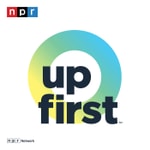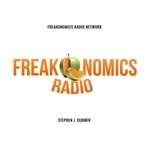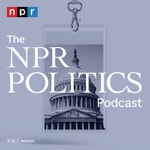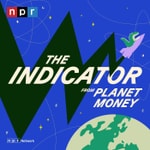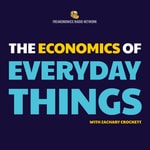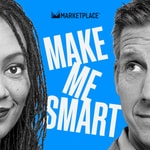Planet Money – Détails, épisodes et analyse
Détails du podcast
Informations techniques et générales issues du flux RSS du podcast.
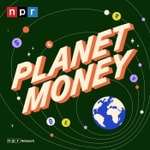
Planet Money
NPR
Fréquence : 1 épisode/3j. Total Éps: 616

Wanna go deeper? Subscribe to Planet Money+ and get sponsor-free episodes of Planet Money, The Indicator, and Planet Money Summer School. Plus access to bonus content. It's a new way to support the show you love. Learn more at plus.npr.org/planetmoney
Classements récents
Dernières positions dans les classements Apple Podcasts et Spotify.
Apple Podcasts
🇨🇦 Canada - business
28/07/2025#8🇬🇧 Grande Bretagne - business
28/07/2025#32🇩🇪 Allemagne - business
28/07/2025#54🇺🇸 États-Unis - business
28/07/2025#33🇫🇷 France - business
28/07/2025#36🇨🇦 Canada - business
27/07/2025#8🇬🇧 Grande Bretagne - business
27/07/2025#29🇩🇪 Allemagne - business
27/07/2025#66🇺🇸 États-Unis - business
27/07/2025#32🇫🇷 France - business
27/07/2025#37
Spotify
🇺🇸 États-Unis - business
28/07/2025#7↗🇺🇸 États-Unis - top
28/07/2025#113↘🇬🇧 Grande Bretagne - business
28/07/2025#50↘🇺🇸 États-Unis - top
27/07/2025#112→🇺🇸 États-Unis - business
27/07/2025#8→🇬🇧 Grande Bretagne - business
27/07/2025#48↗🇺🇸 États-Unis - top
26/07/2025#112↗🇺🇸 États-Unis - business
26/07/2025#8→🇬🇧 Grande Bretagne - business
26/07/2025#49→🇺🇸 États-Unis - business
25/07/2025#8→
Liens partagés entre épisodes et podcasts
Liens présents dans les descriptions d'épisodes et autres podcasts les utilisant également.
See all- http://plus.npr.org/
552 partages
- http://plus.npr.org
459 partages
- https://www.npr.org/newsletter/money
286 partages
- https://www.instagram.com/planetmoney
274 partages
- https://www.instagram.com/rexxliferaj
4 partages
Qualité et score du flux RSS
Évaluation technique de la qualité et de la structure du flux RSS.
See allScore global : 43%
Historique des publications
Répartition mensuelle des publications d'épisodes au fil des années.
How to fix a housing shortage
vendredi 30 août 2024 • Durée 23:29
His vision was well-timed because, in 2019, Minneapolis's city council passed one of the most ambitious housing plans in the nation. One aim of that plan was to alleviate the city's housing shortage by encouraging developers like Cody to build, build, build.
But when Cody tried to build, he ran into problems. The kinds of problems that arise all over the country when cities confront a short supply of housing, and try to build their way out.
Today on the show, NIMBYism, YIMBYism and why it's so hard to fix the housing shortage. Told through the story of two apartment buildings in Minneapolis.
This episode was hosted by Amanda Aronczyk and Kenny Malone. It was produced by Emma Peaslee and Sofia Shchukina, and edited by Molly Messick. It was engineered by James Willets and fact-checked by Sierra Juarez. Alex Goldmark is Planet Money's executive producer.
Help support Planet Money and hear our bonus episodes by subscribing to Planet Money+ in Apple Podcasts or at plus.npr.org/planetmoney.
Learn more about sponsor message choices: podcastchoices.com/adchoices
NPR Privacy Policy
Summer School 8: Big ideas and life lessons from Marx, Keynes and Smith and more
mercredi 28 août 2024 • Durée 32:48
Find all the episodes from this season of Summer School here. And past seasons here. And follow along on TikTok here for video Summer School.
We are assembled here on the lawn of Planet Money University for the greatest graduation in history – because it features the greatest economic minds in history. We'll hear from Adam Smith, Karl Marx, John Maynard Keynes, and some surprising guests as they teach us a little bit more economics, and offer a lot of life advice.
But first, we have to wrap up our (somewhat) complete economic history of the world. We'll catch up on the last fifty years or so of human achievement and ask ourselves, has economics made life better for us all?
This series is hosted by Robert Smith and produced by Audrey Dilling. Our project manager is Devin Mellor. This episode was edited by Planet Money Executive Producer Alex Goldmark and fact-checked by Sofia Shchukina.
Help support Planet Money and hear our bonus episodes by subscribing to Planet Money+ in Apple Podcasts or at plus.npr.org/planetmoney.
Learn more about sponsor message choices: podcastchoices.com/adchoices
NPR Privacy Policy
Summer School 3: The first stock and perpetual life
vendredi 26 juillet 2024 • Durée 34:14
Once upon a time, every business was a small business. It was run by the owner, maybe the spouse and the kids. Maybe they borrowed money from friends and relatives, but there was only so big it could get. Then came what can only be described as the big bang of economics. Over the span of a few decades, people figured out a way for businesses to sell ownership shares – otherwise known as stocks – and let people trade those shares. There was suddenly money to buy machines and expand.
Today, we head to the Netherlands around the year 1600. First, we'll visit the bridge in Amsterdam where some of the first stock trading took place. Then we track down the Dutch water company that's the source of the oldest "living" bond. It's the origin of stocks and bonds and the stock market and it leads directly to many of the financial innovations that we still have today.
This series is hosted by Robert Smith and produced by Audrey Dilling. Our project manager is Devin Mellor. This episode was edited by Planet Money Executive Producer Alex Goldmark and fact-checked by Sofia Shchukina.
Help support Planet Money and hear our bonus episodes by subscribing to Planet Money+ in Apple Podcasts or at plus.npr.org/planetmoney.
Learn more about sponsor message choices: podcastchoices.com/adchoices
NPR Privacy Policy
"Based on a true story"
mercredi 20 septembre 2023 • Durée 28:55
When movie producer Aaron Ryder saw the GameStop story — an army of scrappy underdogs, banding together to strike back against a financial system they felt was rigged against them — he knew it had the makings for a great movie. The only problem: so did a bunch of other movie producers and Hollywood studios. So Aaron found himself in the middle of a fast and furious race to make the first Game Stop movie.
On today's show, one producer's quest to claim the hottest ticket in Tinseltown and the whole hidden machinery dedicated to turning a news story into box office gold. You'll never read the word 'based on a true story' the same way again.
Today's episode was reported and hosted by Alexi Horowitz-Ghazi. It was produced by Willa Rubin, edited by Jess Jiang, engineered by James Willetts, and fact-checked by Cooper Katz McKim and James Sneed. Alex Goldmark is our executive producer.
Help support Planet Money and get bonus episodes by subscribing to Planet Money+ in Apple Podcasts or at plus.npr.org/planetmoney.
Learn more about sponsor message choices: podcastchoices.com/adchoices
NPR Privacy Policy
How to launder $600 million on the internet
samedi 16 septembre 2023 • Durée 26:26
It was the largest crypto heist in history. And now it was Erin's job to find that money and get it back. Erin's investigation would lead her to face off against some of the world's most formidable digital money launderers, whose actions would soon raise alarms at the highest levels of government — even threaten the nuclear security of the entire planet.
This episode was hosted by Jeff Guo and Keith Romer, produced by James Sneed, edited by Jess Jiang, fact-checked by Willa Rubin & Sam Yellowhorse Kesler, and engineered by Maggie Luthar. Alex Goldmark is our executive producer.
Help support Planet Money and get bonus episodes by subscribing to Planet Money+ in Apple Podcasts or at plus.npr.org/planetmoney.
Learn more about sponsor message choices: podcastchoices.com/adchoices
NPR Privacy Policy
China's weakening economy in two Indicators
mercredi 13 septembre 2023 • Durée 18:32
Today, our friends at The Indicator share some of their recent reporting on China. First up, it's a special edition of the Beigie Awards focused entirely on China. What can the approach of the Federal Reserve's Beige Book - i.e. looking at anecdotes that tell us something about where the economy is headed - show us about China's economy?
Then, we take a deep dive into one of the most alarming indicators in China: the skyrocketing urban youth unemployment rate.
This episode was hosted by Darian Woods, Wailin Wong, and Robert Smith. The original Indicator episodes were produced by Corey Bridges with engineering by Robert Rodriguez. They were fact-checked by Cooper Katz McKim and Sierra Juarez. They were edited by Paddy Hirsch and Kate Concannon.
Help support Planet Money and get bonus episodes by subscribing to Planet Money+ in Apple Podcasts or at plus.npr.org/planetmoney.
Learn more about sponsor message choices: podcastchoices.com/adchoices
NPR Privacy Policy
Is economists' favorite tool to crush inflation broken?
vendredi 8 septembre 2023 • Durée 23:17
So where does the idea of this tradeoff – between inflation and unemployment – come from?
That story starts in the 1940s, with a soft-spoken electrical engineer-turned-crocodile hunter-turned-economist named Bill Phillips. Phillips was consumed by the notion that there are underlying forces at work in the economy. He thought that if macroeconomists could only understand how those forces work, they could keep the economy stable.
On today's show, how the Phillips Curve was born, why it went mainstream, and why universal truths remain elusive in macroeconomics.
This episode was hosted by Willa Rubin and Nick Fountain, and produced by Sam Yellowhorse Kesler. It was edited by Molly Messick, and engineered by Maggie Luthar. Sierra Juarez checked the facts.
Help support Planet Money and get bonus episodes by subscribing to Planet Money+ in Apple Podcasts or at plus.npr.org/planetmoney.
Learn more about sponsor message choices: podcastchoices.com/adchoices
NPR Privacy Policy
The prince of prints and his prints of Prince
mercredi 6 septembre 2023 • Durée 28:46
This was early in his career, when he was still building the pop icon reputation he would have today. And in 1984, shortly after Prince had released Purple Rain, he was chosen to grace the cover of Vanity Fair. The magazine commissioned pop culture icon Andy Warhol to make a portrait of Prince for the cover. He used Lynn Goldsmith's photo, created a silkscreen from it, added some artistic touches, and instead of black-and-white, colored the face purple and set it against a red background. Warhol was paid, Goldsmith was paid, and both were given credit.
However, years later, after both Prince and Warhol had passed away, Goldsmith saw her portrait back out in the world again. But this time, the face was orange, and Goldsmith wasn't given money or credit. And what began as a typical question of payment for work, led to a firestorm in the Supreme Court. At the center of it, dozens of questions of what makes art unique. And at what point does a derivative work become transformative? The answer, it seems, has to do less with what art critics think, and more with what the market thinks.
Help support Planet Money and get bonus episodes by subscribing to Planet Money+ in Apple Podcasts or at plus.npr.org/planetmoney.
Learn more about sponsor message choices: podcastchoices.com/adchoices
NPR Privacy Policy
How to fight a patent pirate
vendredi 1 septembre 2023 • Durée 25:18
But as he would soon discover, turmeric wasn't the only piece of traditional or indigenous knowledge that had been claimed in Western patent offices. The practice even had its own menacing nickname - biopiracy. And what started out as a plan to rescue one Indian remedy from the clutches of the U.S. patent office, eventually turned into a much bigger mission – to build a new kind of digital fortress, strong enough to keep even the most rapacious of bio-pirates at bay.
This episode was produced by Willa Rubin with help from James Sneed and Emma Peaslee. It was edited by Molly Messick. It was fact-checked by Sierra Juarez. Our engineers were Josh Newell and James Willetts. Planet Money's executive producer is Alex Goldmark.
Help support Planet Money and get bonus episodes by subscribing to Planet Money+ in Apple Podcasts or at plus.npr.org/planetmoney.
Learn more about sponsor message choices: podcastchoices.com/adchoices
NPR Privacy Policy
Summer School 8: Graduation and the Guppy Tank
mercredi 30 août 2023 • Durée 31:50
Today, you become masters of business administration... spelled with lower-case letters for legal purposes. Your diploma is waiting for you just across the stage.
But first, there's one final skill to impart: the pitch. We wouldn't be doing our job as a half-baked parody of a business school if we didn't leave you with the confidence and opportunity to stand in front of an investor and ask for money. We understand what you ambitious business school graduates really want is the chance to launch something and get rich.
So we're combining graduation with a little test of ideas, a showdown of startups, a competition of companies. We are going to put our own spin on a pitch competition like you see on Shark Tank. We hear from five listeners with real ideas for startups.
Can they make a successful pitch? What will investors be looking for in their presentation? Can they come prepared with persuasive total addressable market analyses? Who will have the sharpest customer pain points to solve? We shall see.
Our business expert will give us a rare glimpse into the mind of investors and what they're looking for. Only one graduate will be crowned the winner as this year's valedictorian.
If you want to get your diploma right now, take the 2023 Planet Money Summer School Quiz to earn your diploma!
If you share it on social media, tag us so we can celebrate with you.
Find all episodes of Planet Money Summer School here.
Learn more about sponsor message choices: podcastchoices.com/adchoices
NPR Privacy Policy


